
He continues: “Every week we had people saying: ‘But this other game does things this way. Why aren’t we?’ Each time we’d answer: ‘Because we don’t want to be just like them.’”
As a result, Carter and the rest of the team, including famed game creator Peter Molyneux, produced a title that seems like a traditional fantasy-themed adventure but actually takes the genre in new directions. In fact, Molyneux notes, Fable is actually an extension of the ideas he explored in an earlier game, the “god simulator” Black & White: “The morality system in Fable evolved from the Black & White morality system. While developing Fable, we realized it was interesting from a moral perspective to give players more choices between good and evil.”
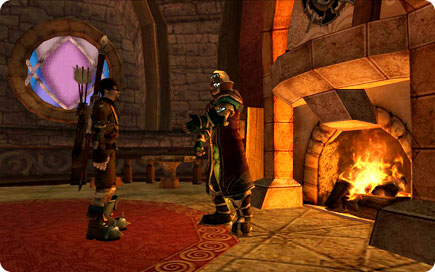
An Intense Conversation. Maze reveals some of the story to Hero during a meeting in his Guild quarters.
“We were very keen to make Fable as original as possible, so we desperately tried to ignore other RPGs and action/adventure games.”
- Dene Carter, lead designer
A More Complex Morality Play
Fable: The Lost Chapters places you in the role of a young character known only as Hero, who lives in a town called Oakvale in the kingdom of Albion. Even as a child, Hero can choose between good and evil. For example, a young girl tasks him with finding her lost teddy bear, but he can decide whether to give it back to her or hand it over to a bully. The former comes with positive alignment points while the latter puts him in negative territory, as do all of the moral decisions you make.
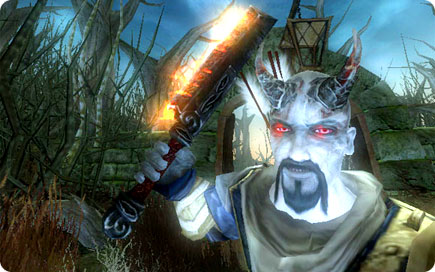
Evil is as Evil Does. The main character on his way to the dark side.
Molyneux has characterized Black & White as a personality test, an assessment that he agrees is applicable to Fable too. “In Black & White, your choices were very straightforward, such as saving or sacrificing a little person,” he explains. “In Fable, we made the moral decisions much more subtle. The decisions are more complex, such as greed versus altruism, compassion versus cruelty, envy versus nobility, and so forth.”
He adds: “Because the game reveals personality traits, it becomes a much more personal experience. In fact, we noticed while watching people play Fable that players found it much harder to take the evil course because the game seemed much closer to real life.”
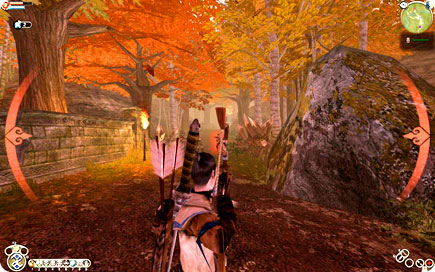
Target Acquired. Lock on an enemy before firing an arrow, to ensure better accuracy.
Mapping the Interactions
Your decisions, and their effect on Hero’s alignment, feed into a complex artificial intelligence system that dictates how NPCs react to him. As Hero becomes an adult and completes more complicated quests, he accumulates renown points, which means his reputation precedes him when he enters a town. Whether NPCs express adoration for him or fear his presence depends on Hero’s alignment. He can even marry one of them, although finding the right spouse requires some trial-and-error with his interaction options, which include flirting, showing off his physique, telling others to follow him, and so forth.
“We developed a visual AI map for interactions, based on a multi-dimensional representation of Hero’s perceived personality,” recalls Carter.
He further explains, “We then gave each villager their own modified version of this map, allowing them to grow and change their reactions based on every single personality variation the player could cause. We called it ‘the three S’s and one R’: scariness, sexiness, silliness, and renown.”
Game Hardware
Check out our systems for your best gaming experience.
- Site: Fable: The Lost Chapters
- Publisher: Feral Interactive
- Developer: Lionhead Studios
- Mac Developer: Robosoft
- Genre: Role-Playing Game
Game Media
“We noticed while watching people play Fable that players found it much harder to take the evil course because the game seemed much closer to real life.”
- Peter Molyneux, creator
Hero’s appearance also changes through the course of the game, becoming angelic or demonic as circumstances dictate. You can also modify his looks by giving him one of several different haircuts and facial hair styles, as well as by getting his body tattooed. You can even change the way NPCs address Hero by purchasing, or earning, a dignified title for him, such as Runemaster.
Choose Your Career
As in a typical RPG, Hero earns experience points that allow him to improve his abilities in various ways. Rather than requiring you to choose a discipline, such as warrior or mage, however, the game simply lets you spend those points as you see fit. If you want to turn Hero into a powerful spellcaster, you can do that. Or perhaps he should be a skilled archer or swordsman. Or maybe his path lies along a jack-of-all-trades route, dabbling in both magic and weapons without focusing solely on one skill.
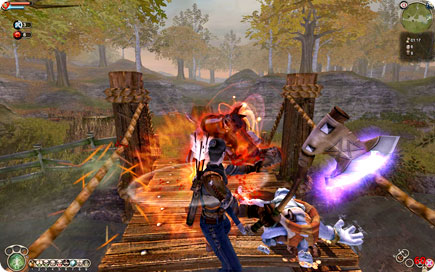
A Fiery Presence. Sure, that axe can deal a lot of damage, but so can that fire spell Hero just cast.
“Several team members were very keen pencil-and-paper role-players when they were younger, and they had very specific complaints about computer RPGs,” explains Carter. “For example, they force you to pick a character class with no foreknowledge of the game, leading you to wonder: ‘What the heck is a ShadowBlinger?’ And they insist you play a specific character, usually someone fairly irritating, rather than allowing you to express your own personality.”
He notes: “Fable has been balanced to be fun, rather than hard, so that it allows you to develop your own strategies and enjoy the world. As a result, our folks have a lot of favored strategies. We have people who slash their way through innocent villagers and return home to their loving wives. Others refuse to use a sword and only use a bow. Ultimately, we don’t punish a player for choosing to play a specific way — it’s their choice.”
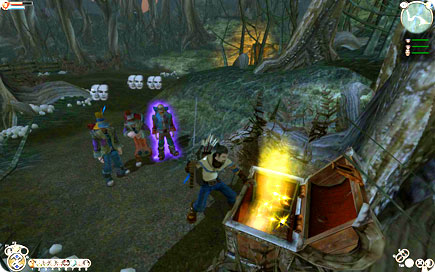
Grabbing Some Loot. The icons above those NPCs means they’re following Hero until he tells them to bug off.
A Mocking Indictment
Hero’s ability to increase his renown, and thus cause all eyes to fall on him when he enters a town, leads Carter to muse: “We’d like to think a lot of people will see the world and the story as a rather mocking indictment of the whole culture of celebrity. Fable mocks the idea that someone who is famous is ultimately ‘better’ than someone who is not.
“No matter what you do in Fable, you’ll still find that everyone is interested in you and is drawn to you. While that’s obviously wrong in a sense, it seems to be the way the real world works, to some degree.”



